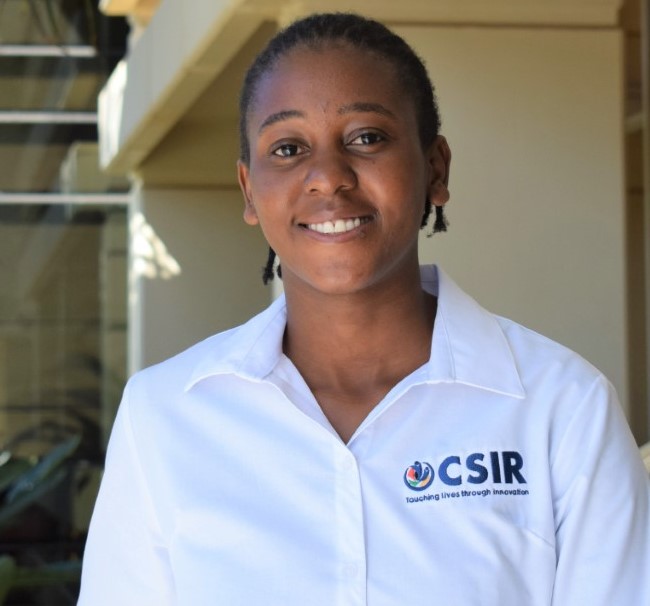Advanced Search
Search Results
Zenande Nombakuse
Full Profile
The presentation aims to bridge the knowledge gap of distributed energy generation to electrify rural communities and measure economic parameters for a sustainable energy solution. The syntheses of energy data collected for analysis enable optimal configuration for energy dispatch of the mini-grid. The essence of the hybrid mini-grid implementation was to provide electricity for basic household needs. The project was developed as the primary service delivery for a remote rural community, thereby creating a framework for the rollout of mini-grids for off-grid electrification.
Lucia Motsa
Full Profile
Whey liquid is a dairy waste by-product produced during the cheese production process. There has been an increased interest in beneficiating this whey and whey products as functional ingredients in food and as nutrients in dietetic and health foods.
The main challenge in whey protein extraction is that it needs to be purified through several expensive extraction unit operations requiring either high heating or highly acidic pre-treatments to initiate precipitation. To shift focus towards innovative techniques, this study investigates the applicability of using a Beckman centrifuge and a vacuum filtration system for highly efficient separation of valuable proteins from whey. Thus, the two process parameters, process time and separation mass yield were investigated.

Pardon Ramazhamba
Full Profile
This study proposes a distributed model that can be used by the South African local government to securely and efficiently share tendering project information with all the parties that have an interest in the project. The proposed model aims to eliminate the use of reports, meetings, presentations and site visits as project information sharing mechanisms with entities that fall within the South African local government.
Additionally, the proposed model seeks to promote the need to share project information and eliminate issues related to a single point of failure or having an organisation that has central powers over project information. The proposed model can also be used to foster collaboration between the public and private sectors by becoming an essential tool that can be used to securely share project information without colluding.
The proposed model also incorporates the benefits and promises that come with the adoption of distributed ledger technology as a technology solution.

Nosipho Mthethwa
Full Profile
Broadband mapping is when the deployment, coverage and quality of broadband are collected and presented for a geographical area.
Broadband mapping is used in several countries to monitor and fast track broadband deployment to ensure internet connectivity for citizens. Literature review has revealed that many European countries have already implemented broadband infrastructure mapping and broadband services mapping.
Studies on broadband mapping show that there are four different types of broadband mapping, namely: broadband infrastructure mapping, broadband service mapping, broadband demand mapping and broadband investment and funding mapping.
Thembela Xaba
Full Profile
Aflatoxin contamination is a threat to human and animal health and also affects the economic status of a country. Despite the threat it poses to humans, animals and the economy, it continues to be a worldwide problem without proper mitigation strategies and solutions. Aflatoxins contaminate a wide range of agricultural produce, even with control measures in place.
Therefore, researchers continue to investigate the ability, applicability and safety of aflatoxin degrading microorganisms that are promising as microbial degradation and can offer degradation under mild conditions, limiting aesthetic and nutritional value of food.

Vivey Phasha
Full Profile
The CSIR Advanced Agriculture and Food cluster, together with the University of KwaZulu-Natal through bioprospecting research, have identified an active ingredient from the cultures of Aspergillus Flavus that has potent tyrosinase inhibition activity, which was developed to address skin hyperpigmentation. Kojic Acid, an active ingredient, was produced via fungal fermentation, then modified to increase its stability, safety and efficacy.
The CSIR optimised the production of Kojic Acid and thereafter synthesised a stable derivative. The Kojic Acid and its derivative were assessed for safety and efficiency. A serum formulation incorporating the derivative was then produced and evaluated for skin irritancy and stability. The results showed that it is stable and safe for use on humans.
This anti-pigmentation product technology has a competitive advantage over existing products on the market since it is safe for use and has scientific data proving its efficacy. This has a huge potential for application in the cosmetic industry.
Tina Chunga
Full Profile
African ginger is an indigenous plant species that grows in the wild and is mostly used by traditional healers to treat asthma. Due to there being a large number of people suffering from asthma, the plant has been over harvested and is now extinct.
The CSIR has identified African ginger cultivation sites in Mpumalanga. To support the use of African ginger in the treatment of asthma, our study compares the African ginger that grows on cultivated land to the one that grows in the wild.

Dr Advaita Singh
Full Profile
The fight against human immunodeficiency virus (HIV) and acquired immunodeficiency syndrome (AIDS), which emerged 40 years ago, has resulted in many parts of the world reflecting on some of the key milestones achieved and the challenges that still remain.
The CAP256 lineage was originally isolated by the Centre for the AIDS Programme of Research in South Africa (CAPRISA) and the National Institute for Communicable Diseases (NICD) from a South African HIV positive patient during a trial conducted by CAPRISA. The outcome showed that the antibodies from the CAP256 lineage displayed broad specificity and were extremely potent against many HIV-1 subtype A and C strains. A scalable plant-based production process has been developed to produced highly potent anti-HIV antibodies, CAP256-VRC26.08 and CAP256-VRC26.09, for therapeutic use.
The production process demonstrated the ability to use glycoengineered Nicotiana benthamiana, a relative of the tobacco plant, to produce unique glycosylation and rare sulfation post-translational modifications, a result that is not usually seen in plants. This research is ultimately aimed towards developing a cost-effective pre-exposure prophylaxis vaccine, which will passively immunise against HIV/AIDS.

Stefan Karamanski
Full Profile
Legged robots need to be tested before deployment. Physics engines are typically used for this, but current physics engines do not handle the impulsive nature of legged robotics correctly. This research aims to solve this problem by developing a trajectory optimised physics engine.

Ndumiso Ndlovu
Full Profile
This project is based on process and product development and in vitro immune-modulatory effects of a standardised multi-plant based solid-liquid extract. Three methods were used for batch-to-batch water extraction, namely: high temperature maceration, soxhlet and reflux extraction. The recovered liquid extract was subjected to downstream processing technology by freeze-drying, spray drying and distillation for powder isolation.

